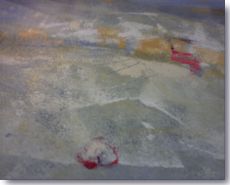Swans Commentary »
April 19, 2010
Pavese and Bible, Blending of Translations
C. Pavese, Genesis, Ecclesiastes
by Guido Monte and Novella Nicchitta
Multilingual Poetry
 confusione
confusione© 2009 Guido Monte
|
(Swans - April 19, 2010)
ORPHEUS: It went like this. We were climbing the path through a grove of shadows. Cocito, Styx, the boat and the moaning were already far away. On the leaves, the glimmer of the sky. I could hear her swishing steps behind me. But I was still there, feeling that coldness. I knew one day, I should have gone back; what had been, will be again. I was thinking about my life with her, how it was before; it would have ended again. What had been, it would be again. I was thinking of the coldness, the void I went through, still present in her bones, her marrow, her blood. Was it worthwhile living again? I thought over it and suddenly I glimpsed a beam of light. So I said "it's over" and I turned towards her. Eurydice blew-out as a candle. I heard a squeaking noise, just like a little mouse now safe.
(tohu wabohu, and the land was left barren)
BACCA: Strange words to believe, Orpheus. You were said to be so dear to God and Goddesses. Many of us look after you as they know you are in love and unhappy, in such a love to go through the void, the only one among men. No, I don't believe your words, Orpheus. The fate left you and it wasn't your fault.
(et les ombres noires enveloppaient les profondeurs)
ORPHEUS: What does fate have to do with it! My destiny never leaves me. After such a journey, after facing up the void, it would be so silly turning for a mistake.
BACCA: Here it's said it was for love.
ORPHEUS: You don't love the one who's dead.
BACCA: And yet you cried through hills and down dales, you looked for her, you called her, you went down to Hades for her. What was that?
(bade korgolòdei dar ruie oghionusoh parmisad spirit on the waves)
ORPHEUS: You say you're like a man. You have to know then, that a man doesn't know how to cope with Death. Mourning Eurydice, I was mourning the season of life. I was looking for something rather different from her love. I was looking for a past Eurydice ignores, which I realized among the dead, singing my song. I saw the shadows stiffing, looking at the void, the moaning ceasing, Persephone hiding her face, the same obscure and impassive Hade bending to listen to my notes, like a man. I realized shadows are nothing.
BACCA: Your sorrow overtakes you, Orpheus. Who wouldn't want the past again? Eurydice was about to come back to life.
(et aura divina super oceani undas spirit on the waves)
ORPHEUS: To die again, Bacca, to have Hade's fear in her blood, to shudder with me day at night. You don't know what the void is.
BACCA: So even though you got your past back thanks to your singing, you sent it back and destroyed it. I cannot believe it.
ORPHEUS: Try to understand me, Bacca. The past was real just in the song. Only listening to me Hade could see himself. Walking on the path, our past was vanishing, it was becoming a memory, it tasted of death. When I saw the first gleam of sky, I startled as an happy and overcome boy, I startled, for the world of living souls. The season that I was looking for was there, in that gleam. I didn't take care of her following me. My past was the glimmer, was the song and the morning. So I turned back.
(et feliciorem iudicavi qui necdum natus est but best of all the never born)
BACCA: How could you resign? When you came back, you were so frightening. Eurydice was your existence.
ORPHEUS: Rubbish. When died, Eurydice has become different. That Orpheus, the one who went down to the Hade, wasn't her husband or her widow. My weeping was like the one from my childhood, and now I smile, remembering it. The time has gone away. As I was crying I wasn't looking for her, but for myself. A destiny, if you like. I was listening to myself.
tohu wabohu, and the land was left barren...
Novella Nicchitta is a student at the Liceo "G. Meli" of Palermo. The fragment of Cesare Pavese, translated by Novella, is from his masterpiece Dialoghi con Leucò (1947).
Picture: confusione, by Guido Monte (2009).
· · · · · ·
Care about Guido's work? Then please consider a donation. Thank you.
· · · · · ·
Legalese
Feel free to insert a link to this work on your Web site or to disseminate its URL on your favorite lists, quoting the first paragraph or providing a summary. However, DO NOT steal, scavenge, or repost this work on the Web or any electronic media. Inlining, mirroring, and framing are expressly prohibited. Pulp re-publishing is welcome -- please contact the publisher. This material is copyrighted, © Guido Monte 2010. All rights reserved.
Have your say
Do you wish to share your opinion? We invite your comments. E-mail the Editor. Please include your full name, address and phone number (the city, state/country where you reside is paramount information). When/if we publish your opinion we will only include your name, city, state, and country.
About the Author
Guido Monte on Swans (with bio). Also, please check Guido's entry on Wikipedia. (back)
· · · · · ·
Internal Resources
Poetry
Arts & Culture
· · · · · ·
This edition's other articles
Check the front page, where all current articles are listed.
Also...
Check our past editions, where the past remains very present.
· · · · · ·
